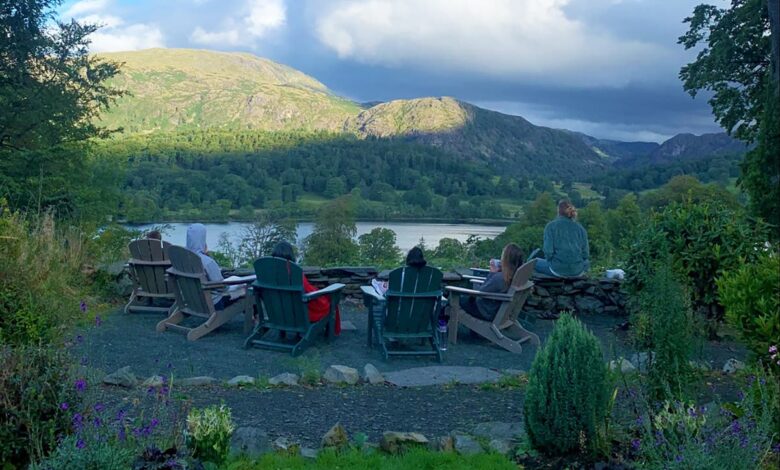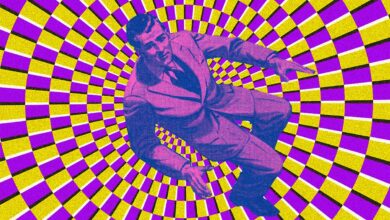Could a resilience retreat help with my stress and PMS?

Up to 75 per cent of women experience premenstrual syndrome. I’m one of them. During my menstrual cycle, I also experience a significant worsening in my bipolar disorder symptoms (a problem well documented among people with bipolar). The result is often extreme mood swings and heightened anxiety, along with severe pain and discomfort. Over the years I have tried to manage my PMS with medication, diets, exercise and varying forms of therapy, failing to find a lasting model of relief.
The Wild Times retreat was founded by qualified yoga instructor Jenny Clarke in 2020. In an age of anxiety and burnout, her retreats focus on resting and regrounding guests through reconnection with nature. One retreat in particular – the Resilience and Cold Water Retreat for Women – promises that “you will leave knowing that you are stronger and more resilient than you thought, rested and ready for whatever life throws at you”. It also offers techniques that help “overcome PMS symptoms”. Given my background, I am keen to sign up.
On the first day of the retreat, we huddle into the lounge for our first seminar with Georgie, who specialises in female physiology and is a master instructor of the Oxygen Advantage method, a technique focused on improving breathing day to day. Georgie tells us that “due to constant stimulation and an endless bombardment of notifications and technology”, most of us are trapped “in an adrenalised loop of fight or flight from the moment we wake up”.
This might sound bad. It gets worse. Not only does the modern world bombard us with an overwhelming cacophony of unmanageable sensations, but – as Georgie points out – women suffer its horrors worse than men. Women consistently report being more stressed than men and are twice as likely to receive a diagnosis of anxiety or depression. This “stress gap” is caused by vast disparities in emotional labour between the genders and, as Georgie elucidates, “because 75 per cent of unpaid work is done by women”. Additionally, stress is thought to be a major contributing factor behind severe PMS symptoms.
Jenny explains that the weekend schedule is designed to help women reduce stress levels and offer “practical, realistic techniques to integrate into normal life”. Through breathwork rituals, yoga, cold water exposure and seminars we will learn what they see as the pillars of stress regulation. Awareness. Regulation. Transformation.
This all takes place on the eastern shores of Coniston Water, in the Lake District, where we are based for our three-night retreat. We’re staying at Lanehead, a Victorian mansion with high white ceilings and crackling marble-edged fireplaces. This estate and its original residents inspired the work of novelist Arthur Ransome, and the on-site studio where we practise flying pigeon pose has (somewhat creatively) been christened Swallows and Artisans.
We go on a long rambling walk around Tarn Hows. Circle a fire pit by moonlight. Scribble thoughts in our Wild Times journals. Jenny nurtures an environment of simplicity – at odds with the sponsored Spandex and designer Lycra that hallmark so much of the wellness industry. She invites us to digitally detox. To nestle into oversized hoodies. To shrug off layers of conditioned performance and productivity.
Our resourceful free range chef Beth Al Rikabi strips our diets back too, replacing refined, processed ingredients with locally sourced or foraged vegan produce. We devour warming millet and buckwheat porridge for breakfast and smoked parsnip soup for lunch, savouring buttery mouthfuls of Beth’s trademark pumpkin seed muffins. Perhaps the “simplest” activity we revisit throughout the retreat is breathwork. But if we are going to practise breathing, we are going to understand why, returning to that early stress regulation pillar: awareness.
During an eye-opening workshop, Georgie unpacks the Bohr effect (which improves the efficiency of oxygen transportation through the blood). “As the world sped up,” she explains, “so did our breathing.” Today, research suggests that 60-80 per cent of the population is breathing dysfunctionally, which means taking too many breaths per minute, or taking in too much air per breath. Patrick McKeown, who developed the Oxygen Advantage method, identifies that a normal breathing rate for a grown adult at rest is roughly 12 breaths per minute, taking in half a litre of air per breath. Very few of us are keeping to this rate.
If you want to know whether you’re dysfunctionally breathing (which statistically, you probably are), look out for these characteristics: too much movement in your upper chest (optimal breathing should engage the abdomen), sighing and yawning throughout the day, or breathing through your mouth (resting breathing should always take place through the nose). Dysfunctional breathing means that the levels of carbon dioxide in our arterial blood are lower than normal. Biochemically, this means a lack of oxygen is being released from haemoglobin, which triggers sleep apnoea, digestive disorders, stress disorders and numerous other health conditions.
In layman’s terms: dysfunctional breathing is very bad, and in a world of chronic stress most of us are breathing dysfunctionally. Which is making us all even more stressed. For women, if we’re constantly in a low level state of stress, we’re much more likely to have painful, heavy periods. “The rhythm at which you’re breathing largely reflects the rhythm at which you’re living your life.” Georgie tells us, “and if we can sort out our breathing, we can learn how to override the stress response.” It is time for us to put this to the test.
I cannot say I am overjoyed at the prospect of cold water exposure. As we descend upon Lake Coniston, wolf-grey clouds loom over the High Fells, and a cold breeze lashes our cheeks. “It looks freezing!” I shiver to the girl next to me as I peel off my jumper. “No!” She beams back. It’s “7C!” Freezing then, I think. We are split into two groups, and I watch as the first group of women emerge from the murky depths, their limbs raw and red, their expressions indiscernible. “You may notice that your feet and hands are completely numb!” Georgie calls out to the semi-submerged women. “If they are – that’s perfectly normal!”
Before I can run away, Georgie asks our group to stretch out on the bank. She leads us through a breathing exercise linked to the Oxygen Advantage method (a series of breathing techniques which help regulate breathing) called “clear your head”, which establishes physiologically healthy breathing and regulates levels of body/brain oxygenation. The result should be a state of calmness. “This is a slightly lighter version of the world-renowned Wim Hof method,” Georgie explains. We double inhale. Exhale. Inhale. Exhale. Following Georgie’s voice as she repeats this sequence.
Minutes pass. I notice an unquestionable sensation of calmness; a subsiding agitation. As we breathe in, my mind becomes quieter. As we breathe out, I forget my fear of the water. When we eventually tread the pebble-strewn lake bed, I am remarkably serene. Of course, the water is cold but it doesn’t faze me as I’d anticipated.
On my train back to London, the gentleman opposite me (who presumably hasn’t discovered headphones) plays pounding techno to the carriage. A baby screams and a VIP takes a string of business calls. I am already flushed and agitated. I take out Georgie’s breathing card and recall her words: “The world is not slowing down anytime soon”.
‘As we breathe out, I forget my fear of the water’
I cannot change the modern world, but as Jenny and Georgie taught me, I can change my responses to it. The train rattles past factories and freight containers. The techno thumps on. I practise one of Georgie’s simple breathing routines, her words ringing through my mind as I inhale. Inhale. Hold. “When you’re in the storm,” she asked us, “can you be the silence?” I slowly let my breath escape.
After days of walking, returning to nature and eating nourishing food, I undoubtedly feel less stressed. Restored. But where this retreat differs from others is that it also sends me away with the understanding and tools to implement changes in my everyday life. Stress, I’ve learned, is a cause of severe PMS, and the retreat has shown me that, through breathwork, I can regulate my stress response wherever I am. Given this, I – and perhaps other suffering women – can finally begin self-regulating PMS. I don’t yet know if I can “be the silence” in a world of endless stimulation and noise but – thanks to the retreat – I certainly have the tools to try.
You can learn more about Georgie and the Oxygen Advantage method here, and book a Wild Times retreat yourself here. Visit here for more information on Beth Al Rikabi’s free-range cookbook
‘You may notice that your feet and hands are completely numb! If they are – that’s perfectly normal!’





